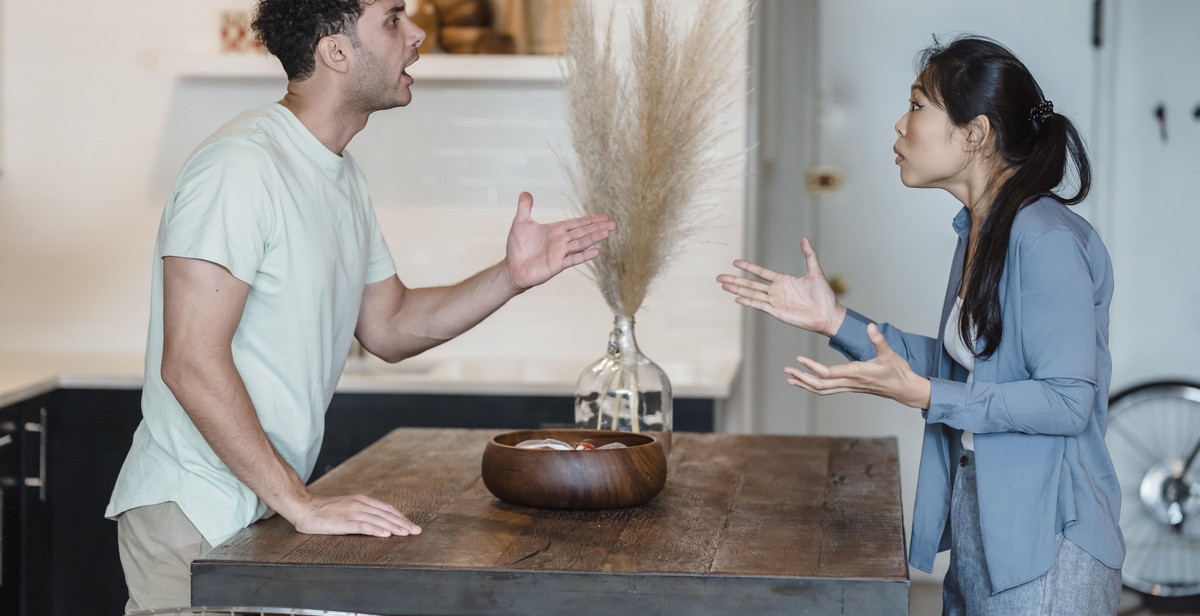The Love Guru’s Guide to Healthy Relationship Dynamics
As a professional article writer and content creator, I have written extensively on the topic of love and relationships. But it’s not just my profession – it’s also my passion. I have spent years studying psychology and human behavior, particularly when it comes to romantic relationships. Through my own personal experiences and working with countless clients, I have gained a wealth of knowledge on the subject.
One thing I have learned is that healthy relationship dynamics are crucial to the success and longevity of any romantic partnership. When both partners feel valued, respected, and supported, they are more likely to stay committed and work through any challenges that arise.
What are healthy relationship dynamics?
Healthy relationship dynamics involve open communication, mutual trust, and a willingness to compromise. Both partners should feel safe expressing their thoughts and feelings without fear of judgment or retaliation. There should also be a balance of power, with neither partner dominating the other.
In this article, I will share my expertise on healthy relationship dynamics and provide practical tips for achieving them. Whether you’re in a long-term relationship or just starting out, these tips can help you cultivate a strong and healthy partnership.

Understanding Relationship Dynamics
Relationships are complex, and understanding the different phases that couples go through can help you navigate your own relationship more effectively. Here are the four main phases of a healthy relationship:
The Power Struggle
The power struggle is the first phase of a relationship. It’s the time when you and your partner are getting to know each other, and you’re both trying to figure out how to assert your needs and wants while also being considerate of your partner’s feelings. This can be a difficult phase, as both partners may feel like they’re not being heard or understood. However, it’s important to remember that this is a normal part of the process, and with good communication and compromise, you can move past this phase.
The Honeymoon Phase
The honeymoon phase is the next phase of a relationship. This is the time when everything feels perfect, and you and your partner are completely infatuated with each other. It’s a time of intense emotions and passion, and it can be easy to get swept up in the moment. However, it’s important to remember that this phase will eventually end, and it’s important to build a strong foundation for your relationship that will last beyond the honeymoon phase.
The Stability Phase
The stability phase is the third phase of a relationship. This is when you and your partner have established a strong foundation, and you’re both comfortable with each other. It’s a time of stability and security, and you’re both able to rely on each other for support. This is an important phase for building a lasting relationship, as it allows you to work through any challenges that may arise.
The Commitment Phase
The commitment phase is the final phase of a healthy relationship. This is when you and your partner have decided to commit to each other for the long-term. It’s a time of deep love and connection, and you’re both willing to work through any challenges that may come your way. This phase requires a lot of trust, communication, and compromise, but it’s also the most rewarding phase of a relationship.
Understanding these different phases of a relationship can help you navigate your own relationship more effectively. By recognizing where you and your partner are in the process, you can work together to build a strong and lasting relationship.

The Importance of Communication
As a love and relationships psychology guru, I have seen time and time again how crucial communication is in maintaining a healthy relationship. Without proper communication, misunderstandings can occur, emotions can be bottled up, and problems can go unresolved. That’s why I always stress the importance of active listening and effective communication techniques with my clients.
Active Listening
Active listening means fully concentrating on what your partner is saying, without interrupting or formulating your response in your head. It involves giving your partner your undivided attention, maintaining eye contact, and acknowledging what they are saying. By doing so, you show your partner that you value and respect their thoughts and feelings.
Active listening also involves asking questions and paraphrasing what your partner has said to ensure that you understand their perspective. This not only helps to clarify any misunderstandings but also shows your partner that you are genuinely interested in what they have to say.
Effective Communication Techniques
Effective communication involves being clear, concise, and respectful in your communication. This means using “I” statements instead of “you” statements, which can come across as accusatory. For example, saying “I feel hurt when you don’t listen to me” is more effective than saying “You never listen to me.”
It’s also important to stay calm and avoid getting defensive or angry during a conversation. If you feel yourself getting emotional, take a break and come back to the conversation later when you are calmer.
Finally, remember to validate your partner’s feelings and opinions, even if you don’t necessarily agree with them. This helps to foster a sense of mutual respect and understanding in your relationship.
| Active Listening | Effective Communication Techniques |
|---|---|
| Give your partner your undivided attention | Use “I” statements instead of “you” statements |
| Maintain eye contact and acknowledge what they are saying | Stay calm and avoid getting defensive or angry |
| Ask questions and paraphrase what your partner has said | Validate your partner’s feelings and opinions |
By actively listening and using effective communication techniques, you can build a strong foundation of trust and respect in your relationship.

Trust and Honesty in Relationships
One of the most important factors in a healthy relationship is trust. Trust is the foundation upon which a relationship is built, and without it, the relationship is likely to fail. Building trust takes time and effort, but it is essential for a strong and lasting connection.
Building Trust
Trust is built through consistent actions over time. It is important to be reliable and dependable, and to follow through on promises. Communication is also key in building trust. Being open and honest about thoughts, feelings, and actions can help to establish trust and prevent misunderstandings.
It is also important to be transparent in a relationship. This means being open about past experiences, mistakes, and flaws. Hiding or lying about these things can erode trust and damage the relationship.
The Role of Honesty
Honesty is a crucial component of trust. It involves being truthful about one’s thoughts, feelings, and actions. Honesty can be difficult at times, especially when it involves admitting mistakes or confronting difficult issues. However, being honest is essential for building trust and maintaining a healthy relationship.
It is important to note that honesty does not mean being hurtful or disrespectful. It is possible to be honest and still be kind and considerate of one’s partner’s feelings. It is also important to be honest with oneself. This means being aware of one’s own feelings and needs, and communicating them honestly to one’s partner.
| Ways to Build Trust and Honesty in a Relationship |
|---|
| 1. Communicate openly and honestly |
| 2. Be reliable and dependable |
| 3. Be transparent about past experiences and flaws |
| 4. Admit mistakes and take responsibility for actions |
| 5. Be kind and considerate of one’s partner’s feelings |
By building trust and honesty in a relationship, couples can create a strong and lasting bond. It takes time and effort, but the rewards are well worth it.

Healthy Conflict Resolution
Conflict is a natural part of any relationship, but it’s how we handle it that determines the outcome. As a love and relationships psychology guru, I’ve seen firsthand how couples who are able to resolve conflicts in a healthy way are able to build stronger and more fulfilling relationships.
Identifying the Issue
The first step to resolving any conflict is to identify the issue at hand. This may seem obvious, but it’s important to take the time to really understand what the problem is. Often, conflicts arise from misunderstandings or miscommunications, so it’s important to listen carefully to your partner’s perspective.
Finding Solutions
Once you’ve identified the issue, it’s time to start finding solutions. This may involve brainstorming together to come up with ideas, or it may involve taking some time to think about possible solutions on your own. It’s important to approach this step with an open mind and a willingness to compromise.
Compromise
Compromise is key to healthy conflict resolution. It’s rare that one person will get everything they want, so it’s important to find a middle ground that both partners can agree on. This may involve giving up something that’s important to you, but it’s important to remember that the goal is to find a solution that works for both of you.
Understanding
Finally, it’s important to approach conflict resolution with an attitude of understanding. This means taking the time to really listen to your partner’s perspective and trying to see things from their point of view. It also means being willing to apologize when necessary and to forgive your partner when they apologize to you.
| Do: | Don’t: |
|---|---|
|
|

The Importance of Self-Care
As a love and relationships psychology guru, I have seen many couples struggle with maintaining a healthy dynamic in their relationships. One of the most important factors in a successful relationship is self-care. Prioritizing your own needs and maintaining your individuality can make all the difference in creating a strong and lasting partnership.
Prioritizing Your Own Needs
It is easy to get caught up in the needs of your partner and forget about your own. However, neglecting your own needs can lead to resentment and burnout. Prioritizing self-care means taking the time to do things that make you happy and fulfilled, whether that be exercise, spending time with friends, or pursuing a hobby. When you take care of yourself, you are better equipped to show up fully in your relationship.
Maintaining Your Individuality
Another important aspect of self-care is maintaining your individuality. It is important to remember that you are your own person, with your own interests and passions. Losing sight of this can lead to feeling suffocated or trapped in your relationship. By maintaining your individuality, you bring a unique perspective and energy to the relationship, making it more dynamic and fulfilling.
- Take time for yourself
- Engage in activities that make you happy
- Remember that you are your own person, with your own interests and passions
In conclusion, prioritizing self-care is crucial for maintaining a healthy relationship dynamic. By taking care of yourself and maintaining your individuality, you bring a strong and unique energy to your relationship, making it more fulfilling for both you and your partner.

Conclusion
As a love and relationships psychology guru, I have seen firsthand the impact that unhealthy relationship dynamics can have on individuals and couples. However, I have also witnessed the transformative power of healthy relationship dynamics.
By implementing the tips and strategies outlined in this guide, you can create a strong foundation for a healthy and fulfilling relationship. Remember to prioritize communication, respect, and empathy in all aspects of your relationship, and be willing to put in the time and effort necessary to maintain a strong connection with your partner.
It’s important to remember that healthy relationship dynamics are not achieved overnight. It takes consistent effort and dedication to ensure that your relationship remains healthy and fulfilling. But the rewards are well worth it: a loving and supportive partner can make all the difference in your personal and professional life.
Take Action Now
- Reflect on your current relationship dynamics: What areas could use improvement?
- Commit to implementing at least one of the strategies outlined in this guide in your relationship.
- Seek out additional resources and support if needed, such as couples therapy or relationship coaching.
Remember:
| Healthy Relationship Dynamics | Unhealthy Relationship Dynamics |
|---|---|
| Open communication | Lack of communication or passive-aggressive behavior |
| Mutual respect | Disrespect or belittling behavior |
| Empathy and understanding | Selfishness or lack of empathy |
| Collaboration and compromise | Power struggles or one-sided decision making |
By prioritizing healthy relationship dynamics, you can build a strong and fulfilling connection with your partner that will stand the test of time.
